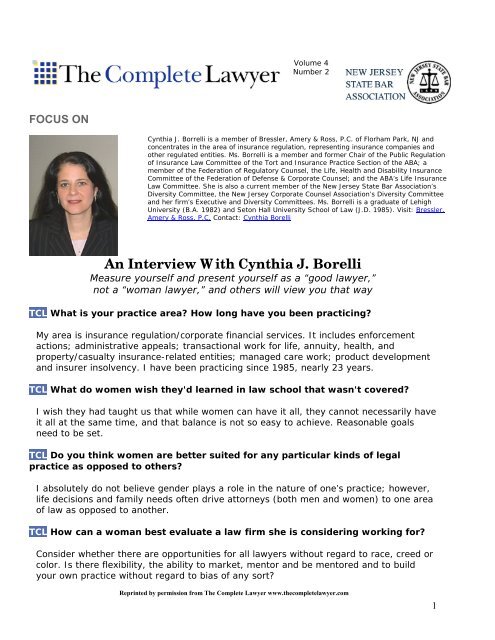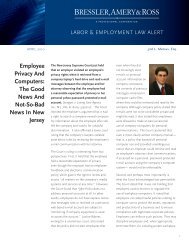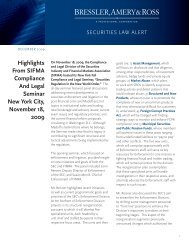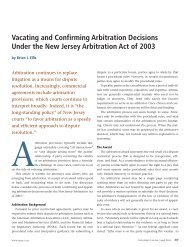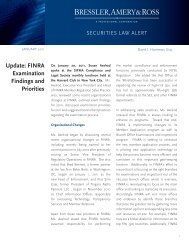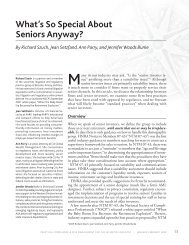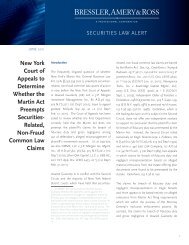An Interview With Cynthia J. Borelli - Bressler, Amery & Ross
An Interview With Cynthia J. Borelli - Bressler, Amery & Ross
An Interview With Cynthia J. Borelli - Bressler, Amery & Ross
Create successful ePaper yourself
Turn your PDF publications into a flip-book with our unique Google optimized e-Paper software.
FOCUS ON<br />
Volume 4<br />
Number 2<br />
<strong>Cynthia</strong> J. Borrelli is a member of <strong>Bressler</strong>, <strong>Amery</strong> & <strong>Ross</strong>, P.C. of Florham Park, NJ and<br />
concentrates in the area of insurance regulation, representing insurance companies and<br />
other regulated entities. Ms. Borrelli is a member and former Chair of the Public Regulation<br />
of Insurance Law Committee of the Tort and Insurance Practice Section of the ABA; a<br />
member of the Federation of Regulatory Counsel, the Life, Health and Disability Insurance<br />
Committee of the Federation of Defense & Corporate Counsel; and the ABA’s Life Insurance<br />
Law Committee. She is also a current member of the New Jersey State Bar Association’s<br />
Diversity Committee, the New Jersey Corporate Counsel Association’s Diversity Committee<br />
and her firm’s Executive and Diversity Committees. Ms. Borrelli is a graduate of Lehigh<br />
University (B.A. 1982) and Seton Hall University School of Law (J.D. 1985). Visit: <strong>Bressler</strong>,<br />
<strong>Amery</strong> & <strong>Ross</strong>, P.C. Contact: <strong>Cynthia</strong> <strong>Borelli</strong><br />
<strong>An</strong> <strong>Interview</strong> <strong>With</strong> <strong>Cynthia</strong> J. <strong>Borelli</strong><br />
Measure yourself and present yourself as a “good lawyer,”<br />
not a “woman lawyer,” and others will view you that way<br />
TCL What is your practice area? How long have you been practicing?<br />
My area is insurance regulation/corporate financial services. It includes enforcement<br />
actions; administrative appeals; transactional work for life, annuity, health, and<br />
property/casualty insurance-related entities; managed care work; product development<br />
and insurer insolvency. I have been practicing since 1985, nearly 23 years.<br />
TCL What do women wish they'd learned in law school that wasn't covered?<br />
I wish they had taught us that while women can have it all, they cannot necessarily have<br />
it all at the same time, and that balance is not so easy to achieve. Reasonable goals<br />
need to be set.<br />
TCL Do you think women are better suited for any particular kinds of legal<br />
practice as opposed to others?<br />
I absolutely do not believe gender plays a role in the nature of one’s practice; however,<br />
life decisions and family needs often drive attorneys (both men and women) to one area<br />
of law as opposed to another.<br />
TCL How can a woman best evaluate a law firm she is considering working for?<br />
Consider whether there are opportunities for all lawyers without regard to race, creed or<br />
color. Is there flexibility, the ability to market, mentor and be mentored and to build<br />
your own practice without regard to bias of any sort?<br />
Reprinted by permission from The Complete Lawyer www.thecompletelawyer.com<br />
1
TCL Do you perceive any differences in the ways in which women and men<br />
lawyers are evaluated by their firms?<br />
I honestly do not although I do think there was an initial expectation in the legal<br />
community that women worked because they had to, not because they wanted to. I<br />
think that this perception has been substantially eroded in the last 23 years. I also do<br />
not think it necessarily impedes success.<br />
TCL What practice areas, if any, do you think suffer if managed by an attorney<br />
working reduced hours? Why do you think that?<br />
<strong>An</strong>y practice area suffers if there is insufficient staff. If a department requires 1000 man<br />
hours per month to meet its work load, and you have only three lawyers, the practice<br />
suffers. If you have a part-timer, you need more bodies to achieve your 1000 hour<br />
goals. On the other hand, ten part-timers who are flexible when necessary can function<br />
as effectively as five full-timers. I believe the ideal practice could be comprised of both<br />
full-time and part-time lawyers and staff.<br />
TCL There is a common perception that women lawyers want to work fewer<br />
hours to play a more integral role in their family life or community or to be a<br />
more balanced person. Please explain how you agree or disagree with that<br />
perception<br />
I disagree with this perception. Most of my male partners have families and devote just<br />
as much time to family commitments as I do. I also have two women partners who are<br />
in the work force while their husbands stay home to manage the household and/or the<br />
day-to-day lives of their children. What I do see is that more of the younger lawyers<br />
(without regard to gender) want to achieve a so-called “balanced life style” without<br />
sacrificing position in the firm, the nature or size of their practice, or income. This is not<br />
a realistic position.<br />
TCL What needs to happen to make the "Mommy track" a desirable alternative<br />
for some women?<br />
I believe it is desirable for any man or woman who chooses it. Many large firms and<br />
companies offer part-time positions with flexibility, substantial professional responsibility<br />
and lucrative salaries. What is problematic is the derogatory title and that some of those<br />
who do choose this part-time path or work reduced hours are not as committed to being<br />
as flexible as they ask their employers to be. Professionals have to work extra hours at<br />
less convenient times when it is required, but can take extra time when the practice<br />
permits it. Lawyers who insist upon absolute limits will not be as beneficial to an<br />
employer and will find employers less willing to be accommodating when they otherwise<br />
would be.<br />
2
TCL Women have constituted 40% of law school graduates since the mid 1980s<br />
but still compose only about 17% of law firm partners. Imagine that a creature<br />
from another planet who has no experience with the legal profession or with<br />
gender differences asks you why there are so few women at the top tiers of their<br />
firms. How would you answer?<br />
Many women do perceive law firms as “sweat shops” with inflexible hours and, hence, go<br />
directly to government work or companies, as opposed to private practice. Women also<br />
often leave firms when they decide to have families because they do not believe they<br />
can balance a private practice and a family. I know from hard, cold experience that it<br />
can be done if you are flexible, open-minded, creative, organized and a solid planner.<br />
You also need to set realistic goals. If more women went to firms or stayed after they<br />
had children and were willing to work flex time or limited hours, they, too, would see it<br />
could be done and done well, with great professional satisfaction. Part of being realistic<br />
requires that a woman with a family put strong support systems in place, either with her<br />
spouse, extended family or traditional child care providers who can come into the home.<br />
A working mom needs help with her children and help to run her household. Outside of<br />
the home, day care falls short of assisting with running the household and chauffeuring<br />
kids to after school activities. While nearly 24 years of live-in help has definite<br />
drawbacks, without it, I could not function effectively in either my personal or<br />
professional life. You have to learn to accept the bad with the good.<br />
TCL What do firms need to do to keep top women lawyers?<br />
Offer part-time and flex-time to both men and women, and work to remove the often<br />
false perception that women cannot succeed in private practice by surrounding young<br />
women with others who have. The stigma that women are often perceived to be<br />
associated with part-time employment or reduced hours (and a different career path)<br />
will likely dissipate as more men make similar choices. The choice then clearly becomes<br />
a life style choice, not a gender-based decision.<br />
TCL What is the most egregious case of discrimination you have encountered?<br />
How did you handle it then and how would you handle it now?<br />
I do not feel discriminated against, nor have I seen discrimination within my firm. If<br />
anything, I have had wonderful opportunities, mentors and supporters. I do think that<br />
older lawyers may believe women are not as interested in professional satisfaction or<br />
career advancement as men. I have, however, found that those with this belief (which<br />
some might view as gender bias) quickly change their minds if an individual works hard,<br />
does fine legal work, and demonstrates a clear and keen interest in excelling.<br />
3
TCL Think of an example of a woman attorney you know who is strong and<br />
powerful, and also warm and compassionate. Please tell us about her<br />
My best friend is a managing attorney and officer of a large insurer. She was my earliest<br />
mentor in the legal profession, as well as a role model as a working mom. She now has<br />
two grown children, and is warm, friendly, passionate, out-going, unquestionably<br />
demanding of herself and those who work with her, powerful within her company and<br />
very opinionated. She is no shrinking violet. What makes her successful is that she<br />
treats everyone equally (which means she is equally demanding, warm and direct),<br />
regardless of gender, social, financial or professional status. You always know where you<br />
stand, what is expected of you, and whether you have met those expectations. I admire,<br />
respect and revere her more than any woman I know.<br />
TCL What are the benefits for women lawyers to have women mentors and role<br />
models? What are the drawbacks?<br />
I have had positive role models, both men and women. Each has made me a better<br />
lawyer and a better person. Women mentors can often make you feel more at ease<br />
because you have gender in common. Women may face similar issues in the profession<br />
and at home, which makes it easier to identify with one another. Commonality can be a<br />
strong bond, whatever its basis. On the other hand, a mentor in your practice area who<br />
might be a man can also be beneficial. You might have common backgrounds, family<br />
issues or outside interests. I prefer a mentor who is skilled, well-respected by his or her<br />
peers, and who is a good teacher, no matter how demanding he or she might be, as<br />
opposed to one who is just like me in every way. What can I learn from someone who is<br />
the same as I am? What unique perspective can that person bring? If women only seek<br />
or benefit from women role models, they will not integrate into the community or into<br />
their firm. You cannot be treated equally if you constantly segregate yourself or view<br />
yourself as a woman first and a lawyer second. If you take that approach, that is exactly<br />
how you will be treated.<br />
TCL What is the best way for women to respond to discrimination from judges,<br />
opposing attorneys, or clients?<br />
Accept that you may encounter it. Be polite but direct and point out your concerns. Do<br />
not challenge discrimination per se. Address the specifics. I also find that it is best to let<br />
little things slide and ignore them. For instance, if a male client is patronizing and you<br />
are sure it is because you are a woman as opposed to young or less experienced, ignore<br />
it, work hard, stay directed, show him that you are capable, and eventually you will earn<br />
his respect. On the other hand, if someone is blatant and offensive, say so and move on.<br />
Get the message across and return to the task at hand.<br />
TCL Do you have any other thoughts to share on this issue?<br />
Strive to do your best both personally and professionally, set realistic goals over time,<br />
and realize that nothing comes without sacrifice and flexibility. Measure yourself and<br />
present yourself as a “good lawyer,” not a “woman lawyer,” and others will view you<br />
that way.<br />
4


